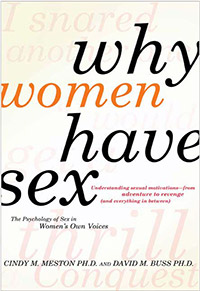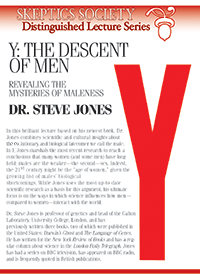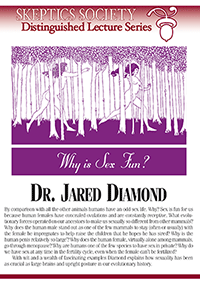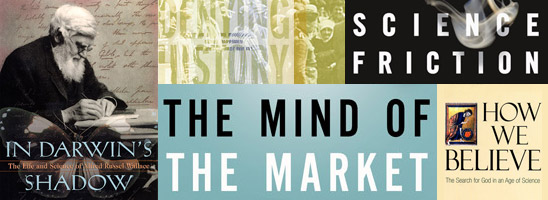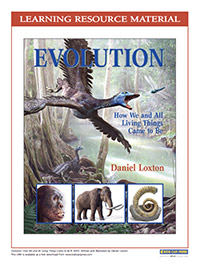Don’t miss this lecture by one of
the greatest minds of our generation…
Jared Diamond
Natural Experiments
of History
Sunday, February 28, 2010 at 2 pm
Beckman Auditorium
book signing to follow the lecture
SOME CENTRAL QUESTIONS in the natural and social sciences can’t be answered by controlled laboratory experiments, often considered to be the hallmark of the scientific method. This impossibility holds for any science concerned with the past. In addition, many manipulative experiments, while possible, would be considered immoral or illegal. One has to devise other methods of observing, describing, and explaining the world.
JARED DIAMOND, author of the Pulitzer-prize winning Guns, Germs, and Steel and the bestselling work in environmental history Collapse, here reveals for the first time his methodology in the applied use of natural experiments and the comparative method. In this lecture based on his new edited volume, Natural Experiments of History, Diamond presents eight comparative studies drawn from history, archaeology, economics, economic history, geography, and political science.
READ more about this lecture…
To Order Tickets
Tickets may be purchased in advance through the Caltech ticket office at 626-395-4652 or at the door. The Caltech ticket office is open only between 12:00 and 5:00 Pacific Time Monday through Friday. $12 Skeptics Society members/Caltech/JPL community; $18 for the general public. We recommend ordering tickets ahead of time for this lecture.
BROWSE all books and DVDs by Jared Diamond in Shop Skeptic.
In this week’s eSkeptic, Victoria Bekiempis reviews Why Women Have Sex: Understanding Sexual Motivations from Adventure to Revenge (and Everything in Between) by Cindy M. Meston and David M. Buss.
Victoria Bekiempis is a freelance writer based in Brooklyn, New York. Bekiempis has written on topics ranging from botched redevelopment projects, to guano harvesting, to reality TV tryouts. She studied philosophy and languages at the University of South Florida. When she’s not working, Bekiempis is probably reading sci-fi or cooking a mean curry.

Why Do Women Have Sex? Here’s Why.
by Victoria Bekiempis
ROMANTIC CRADLING AND ROUGH HAIR PULLING. Power trips and jealous fits. Bouquets and, occasionally, belts. Sometimes, even, unbridled religious ecstasy. As teens, we giddily whisper at sleepovers about it. It’s the subject of exaggerated locker room play-by-plays, as well as sloshed, sloppily narrated barroom tales. It’s in the infamous Porky’s movies as well as in urban legends about a mythic aphrodisiac called the Spanish fly.
The subject of women’s sexual motivations — in plain speak, our turn-ons and turn-offs — isn’t entirely original. The new book, Why Women Have Sex, authored by University of Texas psychologists Cindy M. Meston and David M. Buss, is nevertheless distinct. That’s because their oeuevre is a serious, albeit accessible, discussion of a subject that has been largely ignored by academia. The book effectively explores the little-studied relationship between psychology, physiology and evolutionary pressures on female sexuality.
What spurred the project was a prior, published study by the authors in which women had identified 237 different reasons why they had sex. The basis of this book thus draws on some 1000 women and several years of study to go beyond the running explanations of female sexuality: pleasure and reproduction. To achieve this, Meston and Buss created an anonymous Internet questionnaire. Participating women answered questions about their sexual penchants and proclivities. This data became the basis of the book. These word-for-word accounts, in fact, comprise a large — and very entertaining — chunk of the book. They give a raw, organic edge to a subject that merits it, along with a sense of humanity to something that is primordially enmeshed in our existential experience. This is a subject that could easily — and inappropriately — be stripped and sterilized in conventional, academic writing. This is because there are behaviors that when described from an unbiased third-person perspective can seem to generate a reaction of “nobody’s really like that — I’ve never heard of anyone doing that.” Without first-person accounts of unexpected sexual M.O.s, it seems, some data might be hard to believe.
For example, one woman’s description of confidence-building sex — when a woman engages in sex for an ego boost, really — conveyed a behavior that might be otherwise difficult to describe (or thought of as being the stuff of silver screen femmes fatales, perhaps). She writes: “I had sex with a couple of guys because I felt sorry for them. These guys were virgins and I felt bad that they had never had sex before.…I felt power over them, like they were weaklings under me and I was in control.” Another participant’s recounting of a difficult-to-explain motivation — pity sex — is also in this category of seemingly (but not really) unusual motivations: “I hate letting people down, or hurting people, when I think that I can avoid it…I ended up dating him just to make him feel better about himself, and because I felt like I had led him on, so I ‘owed him.””
Granted, a lot of the explanations are obvious, expected, and quotidian for any chick who’s ever read an issue of Cosmopolitan. Heck, they probably even make sense to the Maxim-reading, Y-chromosome crowd. We have sex, the authors write, for the usual reasons: Love. Attractiveness. Duty. Money. Boredom. Revenge. Even coercion.
We have sex because we don’t want to be the last chick in our social circles to “loose” our virginity and be thought of as frigid and unloving. We have sex to get rid of headaches, to placate nagging partners. And dammit, we have sex out of a sense of curiosity. Sometimes, we want to see if that studly next door neighbor’s reputation holds water. Sometimes, even, we want to see if ethnicity plays a role in lovemaking!
item of interest…
Y: The Descent of Men
Revealing the Mysteries
of Maleness
British geneticist and science author Dr. Jones presents a lively and witty look at the latest research into the Y chromosome and what it takes to make a male… ORDER the lecture
But Meston and Buss also identified the unexpected. Some women, er, get it on to get close to god (really, no joke!). As one participant wrote: “It was a dream come true, being with this incredible man. I was able to lose myself and see God, where the edges of the dream-world and the real world met.”
What fascinated me, both as a woman and a reader, was the authors’ argument that a lot of our sexual motivations stem from evolutionary pressures. This drive doesn’t just include hardwiring toward making babies, they posit. Rather, natural selection has programmed women to keen into, and pursue, men with certain traits. For example, what’s that indiscernible scent that drives us women up the wall? That’s the smell of genes signifying immunological compatibility. What is it about those washboard abs and tall bod that turns us on so much? A man with both probably won’t be out-contended in physical competitions with other men. And the latter more generally implies good health and thus a good genetic pick for mating and offspring.
This entertaining — and primal — description of human attraction, however, lends itself to what might be two flaws of the book, one epistemic and one practical. On the one hand, Why Women Have Sex delves so specifically into our sexual motivations that it’s almost like a lesson in excess reductionism. Of course there’s a chemical and molecular basis to human sexuality, as there is for a vast range of other human behaviors. Is describing post-breakup blues in terms of sudden, rapid hormone drops more accurate or important than describing it with the typical monikers of heartbreak? How it feels to be dumped doesn’t seem to be aptly conveyed in an endochronological context, no matter how fascinating a description of the exact molecular and biochemical pathways might be.
Maybe this is just a tension between folk psychology and scientific psychology, and the sense of something being lost in translation. For example, let’s say a girl has a crush on a tall boy. Yes, it could be argued that the attraction is actually the primal being in her, jonesin’ for a fit mate — tallness a proxy for good genes, biological fitness, etc. When it comes down to it, though, this just doesn’t gel. Maybe I’m a hopeless romantic, but the biological fitness explanation doesn’t fully capture the terror of butterflies in that girl’s stomach or the dizzy, exhilarated whirr of eye contact with said boy. As much as her interest might ignite the reproduction-inclined flames, there seems to be a large amount of conscious decision and personal discretion involved as well.
item of interest…
Why Sex is Fun?
With wit and a wealth of fascinating examples Dr. Jared Diamond explains how sexuality has been as crucial as large brains and upright posture in our evolutionary history…
ORDER the lecture
I’m a very rational woman, and I rarely let emotion get involved in problem solving. The extreme, scientific description of love and romance and attraction, however, rather unscientifically neglects a key characteristic identified by thousands of scholars familiar with the topic, from Plato and Shakespeare to Freud and Marilyn French. So much of this subject seems to deal with the ephemeral, the unknown, that sense of “je ne sais quoi.” When so much love is mixed, sometimes mired, with this gray, when difficulties definitely outweigh any evolutionary ‘pro’ toward pursuing a relationship (as we’ve all seen), I must wonder: Is it a rule that we go for evolution-favored traits, or more so, something that happens often but is not necessarily a law? Of course, that could be the irreparable sap in me talking.
As well, the breadth of Why Women Have Sex is so general and so extensive that I’m left wondering whether it says anything meaningful about women’s sexuality. When confronted with such a vast array of explanations and data, I’m not really sure what to make of it. Yes, the authors answer the “why women have sex” question to a certain degree, but I was left wanting an overarching “meta-why?” if one exists. And if such a “meta-why?” does not exist, I’d like to know “why not?”
These quibbles aside, however, Why Women Have Sex makes for a great survey of female sexuality. It works. I often felt that I was reading a rather entertaining textbook for an introductory course on human sexuality. And, it should be said, that the focus of the book wasn’t the more ephemeral aspects of attraction and lust isn’t problematic to the authors’ aim. It would be unfair to criticize the book for focusing on an aspect of female life that science has greatly ignored when that’s kind of the point.
From an entertainment standpoint, too, the book succeeds. On more than one occasion, in fact, I called up my friends to read them whole paragraphs. That there might be an evolutionary explanation behind the allure of tall, dark and handsome men is perfect for a telephonic gabfest (intellectual girl talk, if you will.) As a woman and a reader, I think the book did a solid job of exploring the whys of female sexual motivations.

Investigator Jimmy Chilcutt, as he appeared in the film Sasquatch: Legend Meets Science
First Impressions
In the world of Bigfoot, good evidence is hard to come by. Anecdotes and blurry photos keep the documentaries coming, but most skeptics agree that a body or a living specimen are needed to confirm the existence of a large North American mystery mammal.
But what of alleged Bigfoot footprints? One expert claims that at least some track castings contain proof of an actual unknown ape. That expert is retired law enforcement agent Jimmy Chilcutt — and he’s agreed to come talk with the skeptics on MonsterTalk.
$10 first edition hardback books
A DEAL LIKE THIS doesn’t come around very often. We’ve got a limited number of first edition hardback books from Michael Shermer including: The Mind of the Market (only $8.95), How We Believe, Science Friction, Denying History, In Darwin’s Shadow, and The Borderlands of Science.

NEW ON SKEPTICBLOG.ORG
An Argument that Should
Never be Made Again
Daniel critiques the common cryptozoological argument, “Where there’s smoke, there’s fire.” He argues that all sides should agree: yes, it is possible for thousands of testimonials to comprise nothing more than a collection of mistakes and hoaxes.
Evolution Resource for
Teachers and Homeschoolers
The Junior Skeptic-based book Evolution: How We and All Living Things Came to Be is supplemented by a free PDF Learning Resource Material booklet, which contains discussion questions and activities.



